Peter Rollins's Blog, page 14
September 24, 2015
Sunday Service, Los Angles, CA
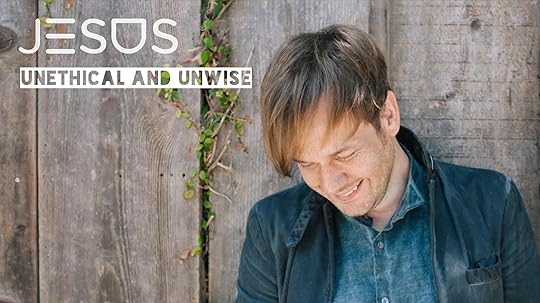
I’ll be speaking at Barry Taylor’s community, exploring the idea that Jesus needs to be understood as against ethics and opposed to wisdom. The show starts at 11:45 and is at 343 S Church Lane, LA. Hope to see you there.
September 23, 2015
The Foolishness of Faith, Deland, FL

I’ll be back in DeLand for a series of fun events over April Fools with Collective. I’ll be weaving in the theme of foolishness in some of the events. These events include,
The Last Supper
For many years Peter Rollins ran an event called The Last Supper in Belfast, Northern Ireland. Once a month a small band of people would gathered around a large oak table in an upper room to share a meal, drink wine and discuss a controversial subject. Each evening would be facilitated by a special guest, who would begin the night with a short talk on the subject. The guest would symbolically occupy the seat of Christ while those gathered would carefully weigh their words and decide whether or not this would be their last supper.
After placing dozens of people in the hot seat we’ve decided that it’s only fair to turn the tables and make Peter take the chair.
In this intimate event Peter will be speaking about the subversive core of his theological project before being interrogated by those at the table. This will be a fun and intellectually stimulating evening, and we envisage tickets selling fast, so buy now to avoid disappointment.
Fulfilling Your Dreams: A horror Story
Everyone wants to get into heaven and avoid hell. Whether it is through religion, drugs, consumerism, higher conscious movements or new technologies, we all want to escape the difficulties and suffering that often haunts our lives. Yet our sacred and secular striving for heaven so often seems to result in hell. In this lecture Peter will argue that heaven and hell are actually profoundly intertwined. That heaven always has hell to pay. Instead he will show that a radical reading of Christianity is one that turns from both, opting instead for a full blooded embrace of the earth.
An Evening of Parables and Pints
Peter is perhaps best known for integrating provocative stories and parables into his talks that connect with our deepest and most disturbing truths. Because of this we’ve asked Peter to talk the art of parables and share some of his favorites. If you have a story or parable then bring it along as we’d love you to share them with us at the end. We’ll pick some of our favorites and integrate them into future Collective gatherings (getting you to tell it if you’re available).
—
Everyone who attends one of these events will receive a limited edition publication from Peter Rollins called The Rapture (this is not available for purchase anywhere)
More information to follow
Collective Event, Deland, FL

I’ll be back in DeLand for a series of fun events with Collective. There are,
The Last Supper
For many years Peter Rollins ran an event called The Last Supper in Belfast, Northern Ireland. Once a month a small band of people would gathered around a large oak table in an upper room to share a meal, drink wine and discuss a controversial subject. Each evening would be facilitated by a special guest, who would begin the night with a short talk on the subject. The guest would symbolically occupy the seat of Christ while those gathered would carefully weigh their words and decide whether or not this would be their last supper.
After placing dozens of people in the hot seat we’ve decided that it’s only fair to turn the tables and make Peter take the chair.
In this intimate event Peter will be speaking about the subversive core of his theological project before being interrogated by those at the table. This will be a fun and intellectually stimulating evening, and we envisage tickets selling fast, so buy now to avoid disappointment.
Fulfilling Your Dreams: A horror Story
Everyone wants to get into heaven and avoid hell. Whether it is through religion, drugs, consumerism, higher conscious movements or new technologies, we all want to escape the difficulties and suffering that often haunts our lives. Yet our sacred and secular striving for heaven so often seems to result in hell. In this lecture Peter will argue that heaven and hell are actually profoundly intertwined. That heaven always has hell to pay. Instead he will show that a radical reading of Christianity is one that turns from both, opting instead for a full blooded embrace of the earth.
An Evening of Parables and Pints
Peter is perhaps best known for integrating provocative stories and parables into his talks that connect with our deepest and most disturbing truths. Because of this we’ve asked Peter to talk the art of parables and share some of his favorites. If you have a story or parable then bring it along as we’d love you to share them with us at the end. We’ll pick some of our favorites and integrate them into future Collective gatherings (getting you to tell it if you’re available).
—
Everyone who attends one of these events will receive a limited edition publication from Peter Rollins called The Rapture (this is not available for purchase anywhere)
More information to follow
September 20, 2015
On the Perpetual Creation of Missing Gods
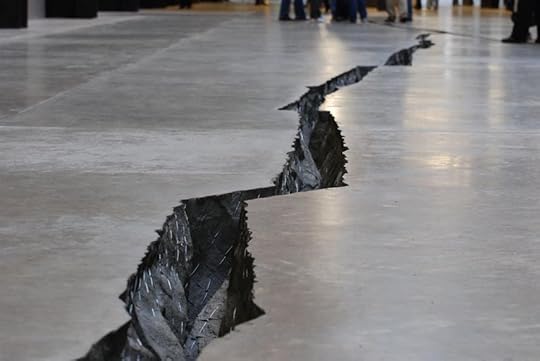
I’m currently putting together a new Atheism for Lent course to run in 2016 (click the link to find out more). As I’ll be providing content for all 40 days of Lent I’ve been busy sifting through some of the most interesting and penetrating critiques of religion to create an interesting, challenging and enriching experience.
As part of this I was re-familiarizing myself with Sartre’s existentialism, and came across a fascinating passage that expresses one of his critiques of theism. At first glance it can seem rather obscure, so I’ll take some time to unpack it,
Everything happens as if the world, man, and man-in-the-world succeeded in realizing only a missing God. Everything happens therefore as if the in-itself and the for-itself were present in a state of disintegration in relation to an ideal synthesis. Not that the integration has ever taken place but on the contrary precisely because it is always impossible (Being and Nothingness).
I’ll take each line in turn,
Everything happens as if the world, man, and man-in-the-world succeeded in realizing only a missing God.
Here Sartre is expressing an observation, namely that those who use the term ‘God’ always seem to be expressing a God who is at a distance from human experience. Even those who affirm a God who is present have to account for an experience of absence, whether this is due to sin, illusion, or ignorance. As such, absence seems to be one of the defining characteristics of affirming the Absolute, whether that is called God, Nirvana, Spirit etc. Hence religious traditions both East and West are always attempting to explain this distance and abolish it.
Everything happens therefore as if the in-itself and the for-itself were present in a state of disintegration in relation to an ideal synthesis.
There are, of course, many who speak of passing moments in which there is a type of presence with the Absolute. Terms like ‘thin places,’ ‘mystical union,’ and ‘oceanic experience,’ are employed to refer to some kind of oneness (ideal synthesis). Yet this is always passing, ethereal, incomplete, dissolving away. To understand why this is the case, Sartre refers to the philosophical terms ‘in-itself’ and ‘for itself.’
The in-itself basically refers to anything that does not experience a sense of alienation. This refers to rocks, coffee, seats, apples and anything else that simply is what it is. A stone is not alienated because it is not a question to itself, a stone simple abides. The universe is filled with things that are in-itself. In traditional theology ‘God’ is in-itself, insomuch as God is not self-alienated. God is described as simple (in the philosophical sense) and at one with God-self.
In contrast, the ‘for-itself’ refers to that which experiences alienation. At its most basic we might say that the for-itself is that which feels separate from other things. In other words, the for-itself refers to consciousness. For consciousness involves an experience of distance. If I look across the street at a car, for example, there is a distance (a nothingness) that I experience between myself and the car, if this nothingness wasn’t grounding my perception of the car then I wouldn’t be able to experience myself as separate from the car. But, not only do ‘I’ feel separate from the car across the road, I also feel separate from my own body and sense of self. I can look at myself objectively (considering aspects of my personality etc.), and thus I experience a sense of separation from my own self. In a sense then consciousness is the experience of distance (what Sartre refers to as ‘nothingness’).
For Sartre, the in-itself can’t be for-itself any more than a triangle can have four sides. To be in-itself is to be lacking the lack, while to be for-itself is to be constituted by it. As an aside, this means that there is a logical impossibility in the traditional notion of God, because that notion defines God as both in-itself and for-itself.
While there are points in our life when the barrier between the in-itself and the for-itself feels thin (in mediation, losing ourselves in a task, drugs, sex etc.), they never meet except in an experience of disintegration.
We might long for that oceanic experience of oneness with the universe, of perfect peace, knowledge and satisfaction, but we can only feel this to the extent that we engage in a certain level of self-deception. To extrapolate on Sartre’s point, there was a brief moment in our genesis when the in-itself becomes for-itself. This is the time when ‘we’ become a self in infancy.
This becoming a self is thus an experience of loss (the loss of the in-itself). But ‘we’ lose nothing. In the vocabulary of existentialism, we actually gain nothing. Nothing is a gain because it is the birth of our subjectivity.
Not that the integration has ever taken place but on the contrary precisely because it is always impossible
In this line Sartre is underlying the impossibility of the fantasy we have of some kind of synthesis in the past or future where the in-itself and for-itself meet. This means that to be human is both amazing and terrifying. Amazing because nothingness becomes something. Terrifying because this means that alienation is part of our lives.
In short, Sartre is warning us that anyone who offers us certainty, satisfaction and an experience of oceanic oneness is writing cheques they can’t cash. There are obviously times in our lives that are haunted by all of these things. Moments when we look out at a beautiful sunset and feel a rush of peace, or during a powerful sexual encounter when we seem to lose a sense of where we end and the other begins. However, while these experiences enrich our lives wonderfully, they are always slipping through our hands, disappearing in the very moment when we try to grasp them. For in trying to grasp them we re-affirm our state as a for-itself and thus move away from the in-itself.
In the above passage Sartre provides us with a wonderful definition of an idol. Namely, a ‘missing God.’ Anytime a preacher, new-age practicer, drug dealer, salesman, or technological guru gives you the formula for losing yourself in the in-itself, they are peddling lies. Lies that gain their power from a profound sense of loss that is a constitutive part of being human. The trick, for Sartre, is to find a way to stop pursing the missing gods constantly being created in sacred and secular temples, and learn to embrace ones wonderful, terrifying, and intoxicating freedom. To take this seriously might not be the end of Christianity, but rather might help us understand it in a much more interesting way, a way that Bonhoeffer touched on in his provisional notes on religionless Christianity.
September 17, 2015
Vanishing Act of God, British Columbia, Canada
 I’ll be working with the First United Kelowna church in British Columbia. I’ll be delivering lectures on Friday evening and all day Saturday. In addition to this I will be giving a sermon on Sunday morning. More information to follow.
I’ll be working with the First United Kelowna church in British Columbia. I’ll be delivering lectures on Friday evening and all day Saturday. In addition to this I will be giving a sermon on Sunday morning. More information to follow.
September 12, 2015
The Largo, Los Angeles, CA
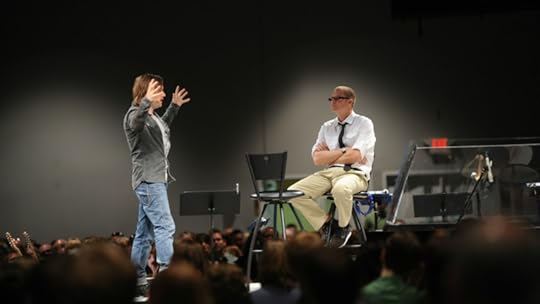
Once again I’ll be teaming up with the one and only Rob Bell for a evening he’s running at my favorite venue in LA, The Largo. In addition to Rob and myself, there should be one or extras in the evening.
To get your ticket, click here
September 10, 2015
Atheism For Lent: A Six Week Online Course
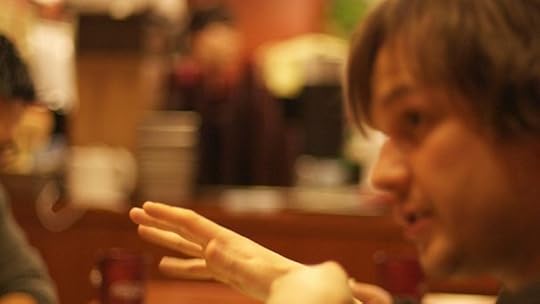
What are you planning to give up this year for Lent?
Chocolate?
Alcohol?
Television?
Well this year I want to offer you another opportunity: giving up religious belief. If you join me you’ll receive a bundle of movies, articles, book excerpts and interviews – one for every day of Lent. Each week I’ll provide an introductory talk on the material and facilitate a Q&A.
So why would you ever want to do this? Perhaps you’ve always been interested in reading some of the best critiques of religion. Maybe you’re a believer who suspects that the material might not be as anti-faith as some say.
Or it could be that you just want some good old-fashioned intellectual stimulation.
Originally I started Atheism For Lent after being inspired by a book called Suspicion and Faith by the philosopher Merold Westphal. In it he argued that many of the greatest atheistic thinkers in the Western World can actually be read as profoundly faithful to the spirit of Jewish, Islamic and Christian thought – an idea that has annoyed and confused people on both sides of the theist/atheist debate.
Well the only way to find out is to dive in.
Also, what better way to spend one’s reflective time in the run up to Easter, where we are confronted with Christ’s cry of dereliction on the Cross. Just as Christ is presented as experiencing the loss of God, so Atheism for Lent gives you the chance to echo that event, discovering what worlds it might open up.
During the course we’ll look at, the advent of modern atheism, the “Masters of Suspicion,” non-theistic existentialism, positivism, contemporary atheism and theological atheism.
September 8, 2015
Vanishing Act of God: A 5 Week On-line Course on The Divine Magician

My latest book, The Divine Magician, represents the culmination of a project I’ve been developing and deepening since How (Not) to Speak of God. By offering my clearest expression of the theory and practice of pyrotheology, the book aims at offering a radical vision of faith that short-circuits the path religion, and opens up a radical reading of faith that echoes what Bonhoeffer called “Religionless Christianity.”
The approach is one that subverts the distinctions between sacred and secular, belief and non-belief, revealing faith as type of incendiary counter-cultural existence foreclosed by the dominant power regimes at work today.
In this five week course we’ll carefully work through the text, exploring the rich constellation of theories and thinkers that inform it and discussing its practical application. Each 90 minute session will involve some introductory remarks, a talk, and a Q&A.
This should be of interest to students of religion, as well as practitioners and those who are interested in applying my work to their lives.
Each week you’ll be sent a private link to the on-line session. Following each class the video will be made available for private download (in case you aren’t able to join on the night). I’ll also provide everyone with some supplemental material (videos, articles and books).
Cost: $25
Dates: 11th Nov, 18th Nov, 25th Nov, 2nd Dec, 9th Dec
August 29, 2015
Dis-Courses: The Theory and Technology of Pyrotheology, Los Angeles, CA
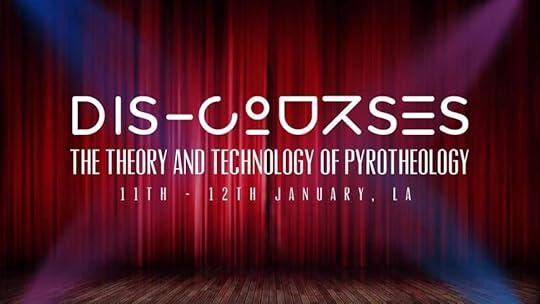
Over the last twenty years I’ve been developing a project called “Pyrotheology.” Influenced by the European intellectual tradition and forged in the context of The Troubles in Northern Ireland, this project has been gradually maturing into a vibrant, international movement.
In this intimate event, I will present a clear and compressive introduction to the theory and practice of pyrotheology, charting its theoretical development and practical implications. The event will not only explore how pyrotheology calls for a fundamental reformation in religion, but also to provide concrete ways in which people on can put it into practice.
This two-day event will provide the participants with an opportunity to learn, engage, and develop the skills required to bring pyrotheology into real world situations. It should be of interest to those involved in actually existing communities of faith, as well as students of religion and laypeople.
There are a maximum of 50 spaces. Price excludes food and accommodation (although there will be plenty of affordable options for both).
Location to be confirmed. But the closest airport will be LAX.
August 16, 2015
The Last Supper, Belfast, UK
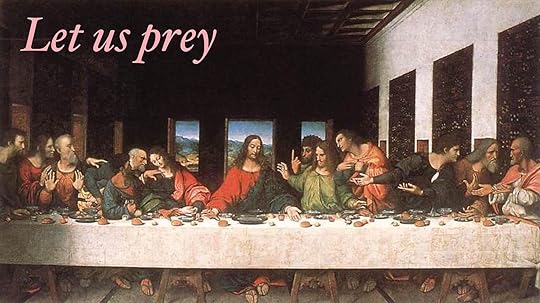
For many years I ran an event called The Last Supper in Belfast. The evening brought together a small group of people who shared a meal while questioning a special guest. The event got its name from the idea that, should the presenter not prove convincing, it would be their last meal.
As I’m home at the moment I thought I’d see if there was any interest in a one off revival, but this time put myself in the hot seat.
The event will be limited to 20 people and it will cost £20 a head (which includes dinner and wine).
Peter Rollins's Blog
- Peter Rollins's profile
- 314 followers



